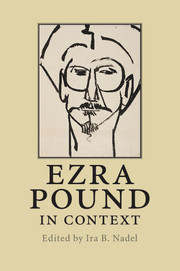Book contents
- Frontmatter
- Contents
- Notes on contributors
- Acknowledgements
- Chronology
- List of abbreviations and note on references to The Cantos
- Introduction
- Part I Biography and works
- 1 Prose criticism
- 2 Poetics
- 3 Translation
- 4 Romance languages
- 5 Letters
- 6 Editor, anthologist
- 7 Education
- 8 Journalism
- 9 Politics
- 10 Economics
- 11 Radio broadcasts
- 12 Law
- 13 Textual criticism
- 14 Archives
- 15 The Lives of Pound
- Part II Historical and cultural context
- Part III Critical reception
- Further reading
- Index
1 - Prose criticism
Published online by Cambridge University Press: 05 July 2014
- Frontmatter
- Contents
- Notes on contributors
- Acknowledgements
- Chronology
- List of abbreviations and note on references to The Cantos
- Introduction
- Part I Biography and works
- 1 Prose criticism
- 2 Poetics
- 3 Translation
- 4 Romance languages
- 5 Letters
- 6 Editor, anthologist
- 7 Education
- 8 Journalism
- 9 Politics
- 10 Economics
- 11 Radio broadcasts
- 12 Law
- 13 Textual criticism
- 14 Archives
- 15 The Lives of Pound
- Part II Historical and cultural context
- Part III Critical reception
- Further reading
- Index
Summary
Writing in November 1919, looking back from the end of the decade in which he entered (and transformed) London literary culture, Ezra Pound characterizes the state of literary criticism in England near the beginning of “the Asquith regime,” close to the time of his 1908 arrival in that country, as
deader than mutton, as I have endlessly noted, it was dead because ideas are disliked…Literary criticism was dead because official and accepted figures like Sir Henry Newbolt were much more concerned with an external and personal correctness than with an internal depth. They were much more anxious to look tidy and emit the seven or eight ligneous bleats required on all polite occasions than to discover international standards and stimulae. (EPCP, iii: 354)
The heavy hand of caricature carries the extreme truth for Pound of his earlier, activist perception and program, which have by now settled into their customary antipathies. These oppositions feature on one side the dead hand of literary convention and insular hebetudes and, on the other, the fresher energies of a transatlantic intelligentsia and pan-European avant-garde, whose experimental verve and inventive temper are coincident in every practical respect with the nascent strengths of the movement we know now as “modernism.” Pound's part in the triumphalist narratives of modernism is of course considerable, including his work both as poet and literary critic and his roles, severally, as contributor, chronicler, agent provocateur, and scold. Yet the larger parts of the narrative of heroic modernism were drafted ex post facto; what they gain in boldness of feature and attraction of animosity, they give away in circumstantial complexity, in the thickness of actual inaugural motivations.
- Type
- Chapter
- Information
- Ezra Pound in Context , pp. 13 - 22Publisher: Cambridge University PressPrint publication year: 2010



